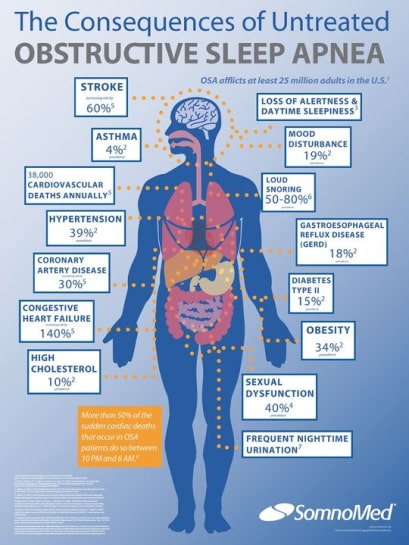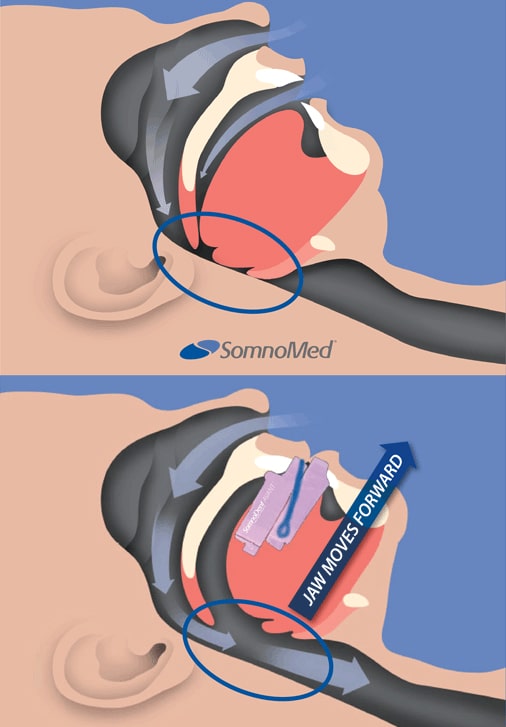Did you know that individuals with sleep apnea will stop breathing multiples times a night? Sleep apnea is a serious medical condition that can cause other medical complications, such as daytime fatigue, high blood pressure, heart problems and Type 2 diabetes, and it can directly impact a bed partner’s sleep. Luckily, most types of sleep disordered breathing can be treated. If you would like to schedule an appointment for sleep apnea treatment in Reno, Nevada, at Northern Nevada Center for Orofacial Pain with our orofacial pain practitioner, call 775-583-7755 today.

What Is Sleep Apnea?
Sleep apnea can be broken down into two main types: central and obstructive sleep apnea (OSA). While we sleep, gravity and muscle relaxation allow the tongue and surrounding soft tissue to fall back into the throat area, collapsing the airway and obstructing air flow.
A combination of central sleep apnea (CSA) and obstructive sleep apnea (OSA) can also manifest in some patients. The gold standard of treatment is the CPAP; however, the majority of patients will discontinue use within a year. Common complaints include noise, pressure, bulkiness, inability to travel easily with CPAP and irritation of the eyes and nose.
Many patients will have a medical evaluation and not be asked about their sleep quality. Patients with cardiac problems or diabetes are not frequently told that sleep disordered breathing may be a factor in their disease. Most primary care physicians are not trained to look at oral risk factors for sleep apnea, such as a large, scalloped and/or coated tongue, dental attrition, a retruded mandible, enlarged tori, anterior/posterior tongue tie and narrow or high palates.
Untreated sleep apnea can cause medical complications such as high blood pressure, stroke, diabetes and obesity, and it can increase the risk of car accidents or stimulant overdose, worsen side effects of medications, and can cause mental health issues. It is important to educate providers and the public about how to recognize sleep apnea in patients and discuss all avenues of treatment.

Schedule Appointment Now
It is not uncommon for an orofacial pain patient to have seen multiple medical and dental providers. The majority of sleep apnea patients are not aware that there are other alternatives to CPAP therapy. If you suffer from orofacial pain or sleep apnea, call us today to schedule a consultation.
775-525-3851
Diagnosis & Treatment of Sleep Apnea
Treatment Options May Include
- Oral sleep appliance therapy
- Sleep hygiene assessment and recommendations
- Addressing aggravating factors, such as alcohol use, sleep position, weight and medications
- Oral appliance therapy if CPAP intolerant
How We Diagnose Sleep Apnea?
Dr. Kim requires all patients to obtain a face-to-face consultation with a sleep physician and complete a one- to two-night polysomnography (PSG). Oral sleep appliances can be beneficial in mild to moderate OSA and even in some severe CPAP-resistant cases. Dr. Kim works with the sleep physician and patients throughout the process and will recommend a follow-up visit and sleep study with the referring sleep physician when optimal dosage is achieved with the oral appliance.
How Do Oral Appliances Work?
The dental sleep appliance fits on the upper and lower teeth similar to a mouth guard. The device functions by bringing the lower jaw forward. Mandibular repositioning helps prevent tongue collapse and stabilizes the musculature that supports the airway, thereby improving patient’s ability to breathe. There are many varieties of dental sleep appliances, and they are custom fit to the patient’s teeth.
Due to some dental-related side effects, it is recommended that a dentist trained in dental sleep medicine screen these patients as well as deliver and adjust these appliances.

Sleep Apnea Facts and Statistics
An estimated 100 million people across the globe have sleep apnea, according to the World Health Organization.
- Studies demonstrate that oral appliance therapy (OAT) has similar effectiveness compared to CPAP.
- Approximately 50% of patients who use CPAP ultimately fail and discontinue use after one year of treatment.
- Patients are more compliant with OAT and prefer it to CPAP, as OAT is considered more comfortable and portable.
- OAT appliances are customizable and, in most cases, can be modified with changes in dentition, e.g., new fillings, crowns, etc.
- While CPAP therapy can be very successful, adverse side effects oftentimes decrease adherence. Such side effects can include dry eyes and/or nose, rhinorrhea, congestion, sore skin/lip, claustrophobia, and interruptions in sleep due to noise.
- A comprehensive exam involves evaluation of the oral airway, dentition and associated structures. Risk factors for sleep apnea can be seen in a routine dental exam, i.e., large tongue, enlarged uvula and tonsils, and evaluation of nasal airway.
- Sleep hygiene is important! Caffeine, screen time, certain medications and even bedroom temperature are some of the many factors that can greatly impact sleep.
Insurance We Accept
We are a non-participating provider with Medicare Part B. We also accept Medicare DME and Prominence Health Plan (Commercial and Medicare Advantage Plans).
If you have questions or need additional information, please give us a call.
775-525-3851